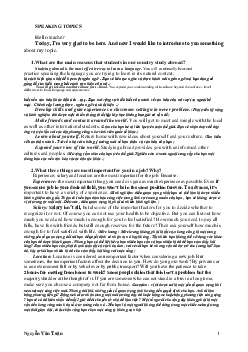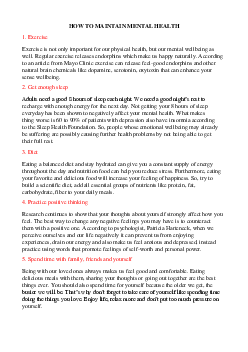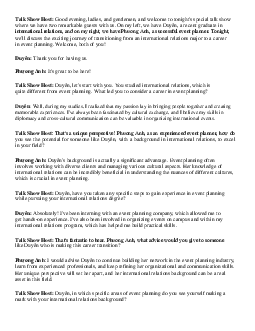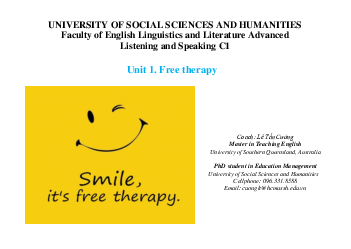

































Preview text:
lOMoAR cPSD| 41487147
Nice sentences/ phrases in Unit 4
1. Does the photo give you a positive impression about the “huge increase” of data that “is changing our lives”?
2. How do you feel about them knowing it?
3. Do you think it illustrates the idea of datatainment?
4. Film and television are probably the two factors of the entertainment industry that generate the most revenue.
5. Using technology, it is relatively easy to log numerous bits of data about what happens during professional sporting events.
6. As a result of overlooking how bored consumers were with formulaic dramas, the analysts incorrectly predicted
that the new TV show would be popular.
7. The success of the video game was notable because so many people had predicted that it would be a failure.
8. What is so impressive about them?
9. In your view, what has been the most revolutionary change in the society in the last decade?
10. Which of these cities would you most like to visit?
11. Improvements in manufacturing allowed the items to be made faster.
12. What traits might help you be successful in this job?
13. What is something you would like to eliminate from your life?
14. Many things we do with technology, such as searching the internet, rely on machine learning.
15. In what ways is it a good thing that humans generate more data every year?
16. The amount of data produced in China and the US will be roughtly equal.
17. Today we’re going to be discussing big data.
18. What we find is that when we have a large body of data, we can fundamentally do things that we couldn’t do
when we only had smaller amounts.
19. This is how society stored and transmitted information. lOMoAR cPSD| 41487147
Video: How do I overcome the fear of pubic speaking?
• What was the speaker’s problem?
• How did he solve it?
• What can you learn from the video?
• How to apply the ideas? lOMoARcPSD|414 871 47 lOMoAR cPSD| 41487147
UNIVERSITY OF SOCIAL SCIENCES AND
HUMANITIES Faculty of English Linguistics and
Literature Advanced Listening and Speaking C1 Unit 5. Fear factor
Coach: Lê Tấn Cường
Master in Teaching English
University of Southern Queensland, Australia
PhD student in Education
Management University of Social Sciences and Humanities Cellphone: 096.331.8588 Email: cuonglt@hcmussh.edu.vn lOMoARcPSD|414 871 47
1.How would you describe the girl in the picture?
2. What might she be facing? Why?
3. Is this common in Vietnam? 4. How to handle it? lOMoARcPSD|414 871 47 lOMoARcPSD|414 871 47 lOMoARcPSD|414 871 47 lOMoARcPSD|414 871 47 lOMoARcPSD|414 871 47 lOMoARcPSD|414 871 47 lOMoARcPSD|414 871 47 lOMoARcPSD|414 871 47 lOMoARcPSD|414 871 47 lOMoARcPSD|414 871 47 lOMoARcPSD|414 871 47 LISTENING PRACTICE 1 lOMoARcPSD|414 871 47 Audio file: Listening exercise 1 (6 minutes 35’) lOMoARcPSD|414 871 47 Key (Listening exercise 1) 31. Call centre 32. Inconclusive 33. methodology/ methods 34. Unequal 35. female/ women 36. Response 37. Control 38. sample/ group 39. their/ other colleagues 40. confidential lOMoARcPSD|414 871 47 LISTENING PRACTICE 2 lOMoARcPSD|414 871 47 Audio file: Listening exercise 2 (6 minutes) lOMoARcPSD|414 871 47 Key (Listening exercise 2) 31. river 32. 3 pairs 33. estimate 34. farming 35. eggs 36. storms 37. guard 38. fence 39. wild 40. media lOMoARcPSD|414 871 47 LISTENING PRACTICE 3 lOMoARcPSD|414 871 47 Audio file: Listening exercise 3 (5 minutes 15’) lOMoARcPSD|414 871 47 Key (Listening exercise 3) 31. Ice age 32. invisible 33. infection 34. flavour 35. fungus/ fungi 36. sexes 37. extinction 38. lowland 39. shelter 40. cuttings lOMoARcPSD|414 871 47
https://www.youtube.com/watch?v=OwgWkUIm9Gc Think of something you fear. Does it cause you to imagine things and be better? lOMoARcPSD|414 871 47 lOMoARcPSD|414 871 47 lOMoARcPSD|414 871 47 lOMoARcPSD|414 871 47 lOMoARcPSD|414 871 47 lOMoARcPSD|414 871 47 lOMoARcPSD|414 871 47 What could we learn from the quote? lOMoARcPSD|414 871 47 SPEAKING PROJECT Option 1 (10/10-30/10) Option 2 - Work in groups of 3-4
- Choose a controversial issue related to one of the topics covered in the course
- Interview at least 5 native speakers/ english speakers (as a second language) about the issue (video recorded)
- Have a group view reflecting what you gained from the interviewees (both content and language–based) lOMoAR cPSD| 41487147
Aspects to consider in the interviews and reflection video
1. Fluency (thought chunking, cohesive devices)
2. Lexical resource (words at B2-C1, collocations…)
3. Grammatical range and accuracy (parts of speech, sentence types…)
4. Pronunciation (syllables, ending sounds…) lOMoARcPSD|414 871 47 lOMoARcPSD|414 871 47







